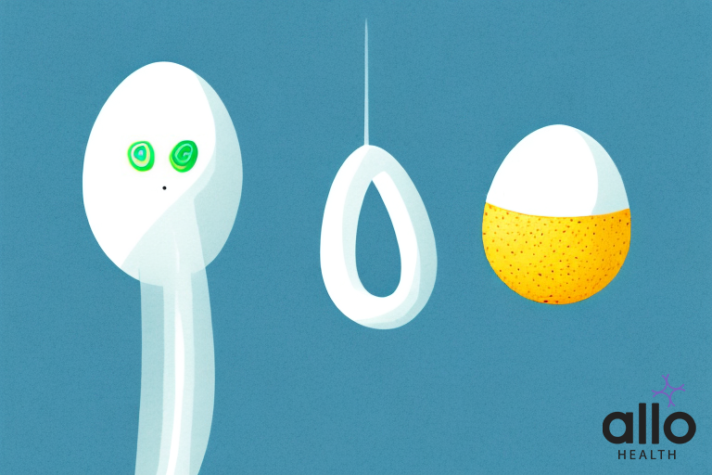What is the Difference Between Impotence and Sterility?

Allo Health is dedicated to personalized well-being, offering support and trusted information tailored to individual health goals. The platform emphasizes human-generated content, led by a distinguished medical team of experts, including physicians and sexual health specialists. Their commitment to credibility involves rigorous fact-checking, authoritative research, and continuous updates to ensure accurate, up-to-date information. Allo Health's unique approach goes beyond conventional platforms, providing expert-led insights and a continuous commitment to excellence, with user feedback playing a crucial role in shaping the platform's authoritative voice.

Dr. Aditi completed her undergraduate medical education at AJIMS, Mangalore, after which she worked in multi-speciality hospitals with COVID patients and in the Pain and Palliative medicine department. Driven by her experiences, she developed a keen interest in psychiatry. Dr. Aditi believes that mental health is just as, if not more important, than physical health.
Why This Was Upated?
Our experts continually monitor the health and wellness space, and we update our articles when new information became available.
Updated on 22 February, 2024
- Article was updated as part of our commitment to diversity, equity, and inclusion.

"The following blog article provides general information and insights on various topics. However, it is important to note that the information presented is not intended as professional advice in any specific field or area. The content of this blog is for general educational and informational purposes only.
Book consultation
The content should not be interpreted as endorsement, recommendation, or guarantee of any product, service, or information mentioned. Readers are solely responsible for the decisions and actions they take based on the information provided in this blog. It is essential to exercise individual judgment, critical thinking, and personal responsibility when applying or implementing any information or suggestions discussed in the blog."
Understanding the distinctions between impotence and sterility is crucial in the realm of sexual health. Impotence, clinically referred to as erectile dysfunction, pertains to the inability to achieve or maintain an erection for satisfactory sexual activity. On the other hand, sterility encompasses the incapacity to conceive and reproduce, often stemming from concerns related to sperm production, ovulation, or reproductive anatomy.
This article aims to delineate the key differences and shed light on the underlying causes and potential treatments for both conditions.
Impotence Vs Sterility: Key Differences
The main difference between impotence and sterility is that impotence refers to the inability to achieve or maintain an erection for sexual activity, while sterility pertains to the incapacity to conceive and reproduce due to factors affecting fertility in either males or females.
| Criteria | Impotence (Erectile Dysfunction) | Sterility (Infertility) |
|---|---|---|
| Definition | Inability to achieve or maintain an erection | Inability to conceive and reproduce |
| Gender | Primarily affects males | Can affect both males and females |
| Causes | Physical, psychological, or a combination of factors | Varied, including concerns with ovulation, sperm production, reproductive anatomy, etc. |
| Sexual Function | Relates specifically to sexual performance | Extends beyond sexual function to include fertility |
| Treatment | Medications, therapy, lifestyle changes | Depends on underlying cause; may include medical, surgical, or assisted reproductive techniques |
| Reproductive Organs | Does not directly impact reproductive organs | Can involve concerns with reproductive organs in both males and females |
| Frequency | Common, especially with age | Can occur in individuals of any age |
What is Impotence (ED)?
- Impotence, clinically known as erectile dysfunction (ED), refers to the condition in which a person consistently experiences difficulty in achieving or maintaining an erection that is firm enough for satisfactory sexual activity.
- This can be caused by a variety of factors, including physical conditions, psychological concerns, or a combination of both.
- Impotence can have a significant impact on a person’s sexual well-being and may also affect their overall quality of life.
- Impotence is a common condition and there are effective treatments available, so seeking medical advice is crucial for those experiencing this concern.

Causes
Physical Factors:
- Cardiovascular Issues: Conditions like high blood pressure, atherosclerosis (hardening of the arteries), and heart disease can restrict blood flow to the penis.
- Diabetes: Elevated blood sugar levels over time can damage blood vessels and nerves, impacting erectile function.
- Neurological Disorders: Conditions such as multiple sclerosis, Parkinson’s disease, or stroke can disrupt nerve signals to the penis.
- Hormonal Imbalances: Low levels of testosterone or imbalances in hormones like thyroid or cortisol can contribute to ED.
- Obesity: Being overweight or obese can lead to conditions like diabetes and cardiovascular problems, both of which are associated with ED.
- Smoking and Substance Abuse: These habits can damage blood vessels and reduce blood flow, affecting erectile function.
- Peyronie’s Disease: This condition involves the development of fibrous scar tissue inside the penis, leading to curvature and potentially erectile difficulties.
- Medications: Certain prescription drugs, particularly those for high blood pressure, depression, and prostate conditions, may have ED as a side effect.
Psychological Factors:
- Stress and Anxiety: High levels of stress and anxiety can interfere with the brain’s ability to send the signals that initiate an erection.
- Depression: This mood disorder can alter brain chemistry in a way that impacts sexual desire and arousal.
- Relationship Issues: Problems within a relationship, communication difficulties, or unresolved conflicts can contribute to ED.
- Performance Anxiety: Worrying about one’s sexual performance can create a self-fulfilling prophecy of erectile difficulties.
Lifestyle and Behavioral Factors:
- Lack of Exercise: Insufficient physical activity can contribute to obesity and cardiovascular issues, which are linked to ED.
- Poor Diet: Diets high in processed foods, sugar, and saturated fats can negatively impact vascular health, affecting blood flow to the penis.
- Excessive Alcohol and Substance Use: Abuse of alcohol or certain drugs can impair nerve function and blood flow.
- Age and Underlying Health Conditions: ED becomes more prevalent with age, and it can be a symptom of an underlying health condition that may need medical attention.
Symptoms
- Difficulty Achieving an Erection: Persistent trouble in getting the penis to become firm enough for sexual activity.
- Difficulty Maintaining an Erection: Difficulty in keeping the erection firm enough to complete sexual intercourse.
- Reduced Sexual Desire: A decrease in the overall interest or desire for sexual activity.
- Lack of Spontaneous Erections: Absence of involuntary, natural erections during sleep or upon waking in the morning, which are normal occurrences in sexually healthy men.
- Emotional Distress or Anxiety: Feelings of frustration, embarrassment, or anxiety related to sexual performance.
- Strain on Relationships: ED can lead to strained relationships due to sexual dissatisfaction and may affect intimacy and communication.
- Low Self-Esteem: A man experiencing ED may have lower self-confidence and self-esteem, particularly in relation to his sexual prowess.
- Depression or Mood Changes: ED can be associated with feelings of sadness or depression, especially if it leads to a significant impact on one’s quality of life.
It’s important to remember that occasional instances of difficulty with erections are normal and not necessarily indicative of ED.
Treatment Options
- Oral Medications: Medications like Sildenafil (Viagra), Tadalafil (Cialis), Vardenafil (Levitra), and Avanafil (Stendra) work by increasing blood flow to the penis, aiding in achieving and maintaining an erection.
- Vacuum Erection Devices (VEDs): These are devices that use a vacuum to draw blood into the penis, creating an erection. A constriction ring is then placed at the base of the penis to maintain the erection.
- Injections and Urethral Suppositories: Medications like Alprostadil can be injected directly into the base or side of the penis, or inserted as a suppository into the urethra. They help to increase blood flow and create an erection.
- Penile Implants: Surgically implanted devices that can provide an on-demand erection. There are inflatable and semi-rigid implants available.
- Hormone Replacement Therapy (HRT): In cases where low testosterone levels contribute to ED, hormone replacement therapy may be recommended.
- Psychological Counselling and Therapy: Addressing underlying psychological factors like anxiety, depression, or relationship issues with a trained therapist can be an effective treatment approach.
- Lifestyle Changes: Adopting a healthy lifestyle which includes regular exercise, a balanced diet, reducing alcohol consumption, quitting smoking, and managing stress can improve erectile function.
- Pelvic Floor Exercises (Kegel Exercises): These exercises can strengthen the pelvic floor muscles, which play a role in achieving and maintaining erections.

What is Sterility (Infertility)?
- Sterility, also known as infertility, refers to the inability of a person or a couple to achieve pregnancy or conceive a child despite regular, unprotected sexual intercourse over a significant period of time, usually a year or more.
- In cases of sterility, either one or both partners may experience difficulties in the reproductive process. This condition can be attributed to various factors, including concerns related to sperm production, ovulation, fallopian tube blockages, hormonal imbalances, or reproductive anatomy.
- Infertility is a common concern, and there are medical interventions and treatments available to help individuals and couples overcome this challenge and achieve successful pregnancies.
- Consulting a healthcare professional is crucial for a proper diagnosis and appropriate treatment plan.
Causes
Causes of Sterility in Men:
- Low Sperm Count (Oligospermia): Insufficient production of sperm, leading to reduced chances of fertilizing an egg.
- Poor Sperm Motility: Sperm may have difficulty moving effectively, making it harder for them to reach and penetrate the egg.
- Abnormal Sperm Morphology: Sperm with abnormal shape or structure may have difficulty in fertilizing an egg.
- Varicocele: Enlarged veins within the scrotum can lead to higher temperatures in the testicles, potentially affecting sperm production.
- Obstruction of the Reproductive Tract: Blockages or obstructions in the tubes that transport sperm from the testes to the urethra can prevent sperm from being ejaculated.
- Hormonal Imbalances: Disruptions in hormone levels, particularly testosterone, can affect sperm production.
- Sexual Dysfunction: Conditions like erectile dysfunction or premature ejaculation can impact a man’s ability to engage in sexual intercourse.
- Genetic Factors: Certain genetic conditions can lead to infertility in men.
- Environmental Factors: Exposure to toxins, radiation, or certain chemicals can harm sperm production.
Causes of Sterility in Women:
- Ovulation Disorders: Irregular or absent ovulation can lead to difficulty in releasing mature eggs for fertilization.
- Polycystic Ovary Syndrome (PCOS): A hormonal disorder that can disrupt ovulation.
- Blocked Fallopian Tubes: Obstructions in the fallopian tubes can prevent sperm from reaching the egg or block the fertilized egg from reaching the uterus.
- Endometriosis: Tissue similar to the lining of the uterus grows outside the uterus, which can interfere with the implantation of the fertilized egg.
- Uterine Fibroids: Noncancerous growths in the uterus that can interfere with implantation.
- Pelvic Inflammatory Disease (PID): Infections in the reproductive organs that can cause scarring and blockages.
- Age-Related Decline in Fertility: As women age, the quality and quantity of eggs decline, making it harder to conceive.
- Hormonal Imbalances: Imbalances in hormones like estrogen and progesterone can affect fertility.
- Thyroid Disorders: Disorders of the thyroid gland can disrupt the menstrual cycle and ovulation.
- Unexplained Infertility: In some cases, the exact cause of infertility may not be identified despite thorough evaluation.
Treatment Options
Treatment Options for Men:
Medications: Fertility drugs may be prescribed to address hormonal imbalances or stimulate sperm production.
Surgery: Surgical procedures can correct issues such as varicocele repair or clear obstructions in the reproductive tract.
Sperm Retrieval Techniques: Procedures like Testicular Sperm Aspiration (TESA) or Percutaneous Epididymal Sperm Aspiration (PESA) can retrieve sperm directly from the testicles or epididymis for use in assisted reproductive techniques.
Assisted Reproductive Techniques (ART): Techniques like Intrauterine Insemination (IUI) or In Vitro Fertilization (IVF) can be employed to facilitate fertilization.
Lifestyle Modifications: Adopting a healthy lifestyle, including regular exercise, a balanced diet, reducing alcohol consumption, quitting smoking, and managing stress can improve fertility.
Treatment Options for Women:
Fertility Drugs: Medications can stimulate ovulation or regulate hormonal imbalances.
Intrauterine Insemination (IUI): Sperm is directly inserted into the uterus around the time of ovulation to increase the chances of fertilization.
In Vitro Fertilization (IVF): Eggs are harvested from the ovaries, fertilized in a lab, and then implanted in the uterus.
Intracytoplasmic Sperm Injection (ICSI): A single sperm is injected directly into an egg in the lab, which can be particularly helpful in cases of male factor infertility.
Surgery: Procedures like laparoscopy or hysteroscopy can address conditions like endometriosis, fibroids, or structural abnormalities in the reproductive organs.
Assisted Reproductive Techniques (ART): Techniques like IVF and ICSI may be used to facilitate fertilization.
Lifestyle Changes: Adopting a healthy lifestyle, including regular exercise, a balanced diet, reducing alcohol consumption, quitting smoking, and managing stress can improve fertility.
Donor Eggs or Sperm: Using donated eggs or sperm may be an option in cases where one partner has infertility concerns.
Surrogacy: In situations where a woman is unable to carry a pregnancy to term, a surrogate may carry the pregnancy on her behalf.
Gestational Carrier: This involves using the eggs of the intended mother or a donor, fertilized by sperm from the intended father or a donor, and then placing the embryo in a gestational carrier.
The most appropriate treatment for sterility or infertility depends on the individual’s specific circumstances, including the underlying causes and overall health.Consulting a healthcare professional or fertility specialist is crucial to determine the most effective and safe treatment plan.
Key Takeaways
- Understanding impotence (ED) and sterility (infertility) is vital for sexual health.
- Impotence is the inability to achieve or maintain an erection, while sterility is the inability to conceive.
- Impotence primarily affects males, while sterility can affect both males and females.
- Impotence arises from physical or psychological factors, while sterility can result from various causes in both genders.
- Treatment for impotence includes medications, therapy, and lifestyle changes, while sterility treatment depends on the underlying cause.
- Impotence doesn’t directly impact reproductive organs, but sterility can involve concerns with reproductive organs in both genders.
- Impotence becomes more common with age, while sterility can occur at any age.
- It’s essential to seek medical advice for both conditions to explore appropriate treatments.
- Causes of impotence include physical, psychological, and lifestyle factors, while sterility causes differ in men and women due to various factors affecting reproductive health.
Frequently Asked Questions
Q: Is impotence a normal part of aging?
A: While impotence becomes more common with age, it is not considered a normal part of aging. It often indicates an underlying health issue that may need attention.
Q: When should I seek medical help for impotence?
A: It’s advisable to seek medical advice if you experience persistent difficulties with erections, as this could be a sign of an underlying health condition that requires attention.
Q: Can age affect fertility?
A: Yes, as women age, the quality and quantity of eggs decline, making it harder to conceive. However, age can also impact male fertility, although to a lesser extent.
Q: When should I seek medical help for sterility?
A: If you have been actively trying to conceive for a year without success (or six months if you’re over 35), it’s advisable to consult a healthcare professional for further evaluation and guidance.
Q: Is impotence a reversible condition?
A: In many cases, impotence is treatable. With the right approach, including lifestyle changes and appropriate medical intervention, individuals can often regain normal erectile function.






































